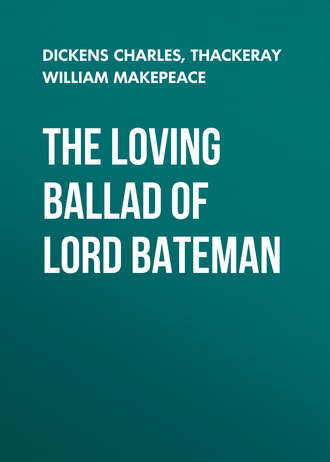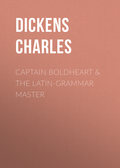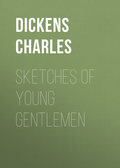полная версия

Чарльз Диккенс
The Loving Ballad of Lord Bateman
Who never vos heerd to speak so free:11
Sayin, "You'll not forget my ounly darter,
If so be as Sophia has crossed the sea."
XX
"O it's true I made a bride of your darter,
But she's neither the better nor the vorse for me;
She came to me with a horse and saddle,
But she may go home in a coach and three."
XXI
Lord Bateman then prepared another marriage,
With both their hearts so full of glee,
Saying, "I vill roam no more to foreign countries
Now that Sophia has crossed the sea."12
11. Then up and spoke this young bride's mother,Who never vos heerd to speak so free. This is an exquisite touch of nature, which most married men, whether of noble or plebeian blood, will quickly recognise. During the whole of her daughter's courtship, the good old lady had scarcely spoken, save by expressive smiles and looks of approval. But now that her object is gained, and her daughter fast married (as she thinks), she suddenly assumes quite a new tone, "and never was heerd to speak so free." It would be difficult for poetry to comprehend any thing more strictly true and life-like than this.
12. With both their hearts so full of glee If any thing could add to the grace and beauty of the poem, it would be this most satisfactory and agreeable conclusion. At the time of the foreign lady's arrival on the shores of England, we find Lord Bateman in the disagreeable dilemma of having contracted another marriage; to which step his lordship has doubtless been impelled by despair of ever recovering his lost Sophia, and a natural anxiety not to die without leaving an heir to his estate. The ceremony has been performed, the Church has done its office, the bride and her mamma have taken possession of the castle, when the lost Sophia suddenly presents herself. An ordinary man would have been overwhelmed by such a complication of perplexities – not so Lord Bateman. Master of the human heart, he appeals to feminine ambition and love of display; and, reminding the young lady that she came to him on a saddle horse (with her revered parent following no doubt on foot behind), offers to bestow upon her a coach and three. The young lady closes with the proposition; her august mother, having brought it about by her freedom of speech, makes no objection; Lord Bateman, being a nobleman of great power, and having plenty of superfluous wealth to bestow upon the Church, orders another marriage, and boldly declares the first one to be a nullity. Thereupon "another marriage" is immediately prepared, and the piece closes with a picture of general happiness and hilarity.





